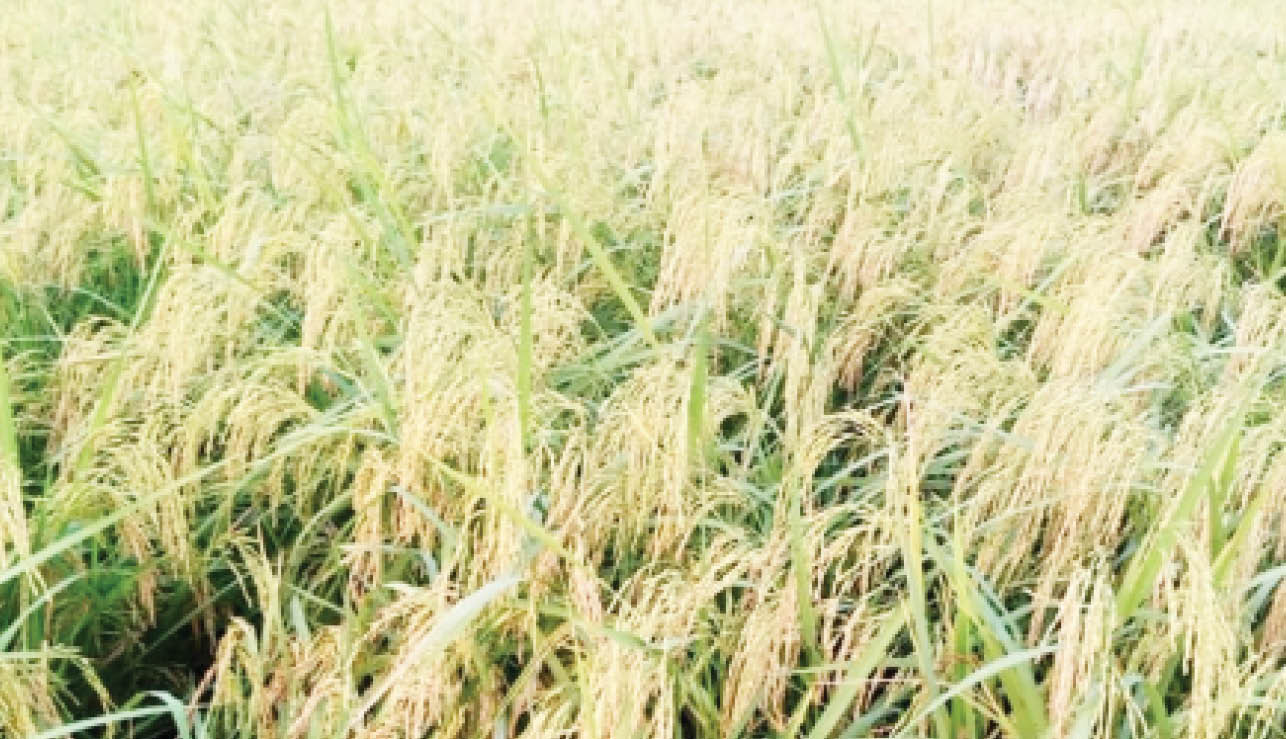Following perennial flood disasters in Nigeria that have led to the loss of many hectares of rice farms across the country, the National Cereal Research Institute (NCRI), Badeggi, Niger State, has introduced flood-resistant rice variety to save farmers from losses and mitigate the impact of flooding on the country’s food security.
Findings by Daily Trust on Sunday revealed that the seed variety has a high yielding capacity and does not require excessive application of fertiliser as it also has the veracity to survive drought.
The head of Rice Research Programme of the institute, Dr Muhammad Bashir Enagi, told our correspondent that so far, the institute had developed and released 68 rice varieties in Nigeria, popularly known as Faro-lines.
He said the Faro-66 and 67 were the newly introduced flood-resistant variety and could still survive if covered in the water for two weeks, explaining the maximum days the variety would decompose if covered in water for more than two weeks.
Again, Kano tomato farms under pest attack
How rising prices hurt Ramadan celebrations
He said the institute had also introduced drought-resistant Faro-68 with a high yielding capacity when compared to the old varieties that farmers were used to.
“We have released Faro-1 to Faro-68. These Faro-lines are developed and released for different ecologies because in Nigeria, we have upland rice ecology. We have rain-fed lowland ecology and irrigated low land ecology and mangrove ecology.
“So, these varieties were released to address all the key ecologies in Nigeria, and out of these, Faro-1 to 68 that have been released, 9 varieties are suitable for lowland and they are currently being accessed by farmers. These include Faro-44, Faro-52, Faro-57, Faro-60, Faro-61, Faro-62, Faro-66, Faro-67 and Faro-68. They are for both rain-fed and irrigated lowland ecology.
“For upland ecology, there are six varieties that are currently being accessed by farmers, which are Faro-55, 58, 59, 63, 64 and 65, and for upland ecology production.
“Recently, we released Faro-67 and 66; and they were released four to five years ago, since 2017. These varieties are high yielding and they meet consumers’ preference in Nigeria with low and milo content. It will give high yield under good management. They also have outstanding characteristics, which means they are tolerant to flood because we observed that even last year, most of the farmers lost their rice due to heavy downpour that submerged the whole of their rice farms. We now developed this variety to mitigate such menace in terms of rice production.
“So, these two varieties are flood-tolerant. If your rice is flooded for two weeks, once the water recedes, the varieties would come up again, but anything after two weeks, they would be damaged and would decompose. So, they have these characteristics for just between one and two weeks,” he said.
Dr Enagi also said the institute recently developed another variety known as Faro-68, with a yield potential of 11.6 metric tonnes per hectare under good management.
“Under lowland, we have what we call high toxicity, which retards growth. So, this variety can withstand drought and high toxicity. It withstands drought because it matures within 120 days under lowland ecology, as compared to 135 days we usually had in those days.
“Presently, Faro-67 and 66 are already being accessed by farmers. People are producing it already in large quantities,” Enagi added.
He said the flood-resistant rice variety could be accessed in the institute and various seed companies, including Ideal Seed Company in Bida, Niger State, Premium Seeds in Kaduna, and among others in Kano, which he said already had the seeds in their stock for sale.
“For the Faro-68 we recently released, the seed is not as much as available now because we just released it and we have not produced it in large quantities. But as soon as we have them in a large quantity, we will open the market.
“Faro-68 also has one outstanding characteristic: the grain length is very long. And it will be good for tuwon-shinkafa and other varieties of food prepared from rice,” he said.
Application of fertiliser
While farmers spend heavily on fertilisers to manage the old variety of rice seeds, the National Cereal Research Institute, Badeggi stated, “This new variety does not need fertiliser in high quantity. At the establishing stage we advise farmers to apply four bags of NPK fertilizer, while at the vegetative stage, we advise them to apply just one bag of Urea per hectare. When the crop is moving towards the reproductive stage, when they are about flowering, we also advise farmers to apply one bag of Urea fertiliser per hectare. So, in that instance, for one hectare, a farmer needs six bags of fertiliser of 60kg – four bags of NPK and 2 bags of Urea. With these six bags, the farmers would be able to hit up the potential of that variety.”
Farmers, experts express optimism
Farmers and experts have expressed optimism that the newly introduced varieties of rice seeds would boost food production and mitigate the impact of food insecurity the country was battling with.
The head of Rice Research Programme of the NCRI, Dr Muhammad Bashir Enagi said, “With the present administration of President Muhammadu Buhari, which is trying to diversify the economy of Nigeria in favour of agriculture, and by blocking the borders to avoid the infiltration or illegal import rice especially, we can now see that farmers are well encouraged in going back to farming. It now shows us that we should eat what we produce, and eating what we produce encourages farmers to go for more. And eating the adulterated rice they are bringing for us from outside Nigeria has been stopped.”
Dr Enagi explained that the new varieties of rice being released had a high yielding capacity to boost food production in the country, saying that “in olden days, you will hardly get 40 bags of 75kg from one hectare because in the ancient varieties that farmers used to plant, you would hardly get even four bags from one hectare, even under maximum utilisation of fertiliser and weed management. But with these ones we are releasing now, and with the good practices we are teaching our farmers, they can harvest between 60 and 70 bags from one hectare. So, with this, we have added value to the economy of the country by developing high yielding varieties that also address most of the key production challenges.”
A farmer in Lavun Local Government Area of Niger State, Mallam Gimba Usman, confirmed to Daily Trust on Sunday that the new variety had yielded more than the old varieties.
“If you cultivate a hectare of land using the normal variety of rice and you get like 70 bags, with this new variety, you will get like 100 bags. The difference is very wide in terms of quantity. It is also easy to thrash and it has a better taste than the former varieties. And you can put small fertiliser and it can survive and yield well. And it doesn’t need too much water to grow.
“When you plant Faro-67 in one hectare, normally, before this variety was introduced you can get like 5 tonnes, but now, it can cover like 7 tonnes per hectare. And when water covers it, after three weeks the rice can germinate again. This variety can be in water for three weeks and would still grow when water recedes, but after two to three weeks, it would also die.
“The normal rice we had before, when water covered for a week it would die, but this one can be in water for 19 days and it will still germinate,” he said.
He said that while the variety had high yielding capacity, it was attractive to birds and rodents more than the old varieties, which he said was the major challenge farmers face.
Some farmers in Edozhigi, one of the major flood ravaged communities in Gbako Local Government of Niger State, said they were yet to get information of the newly introduced variety as they expressed happiness to adopt the variety beginning from this rainy season to save them from perennial losses.

 Join Daily Trust WhatsApp Community For Quick Access To News and Happenings Around You.
Join Daily Trust WhatsApp Community For Quick Access To News and Happenings Around You.


